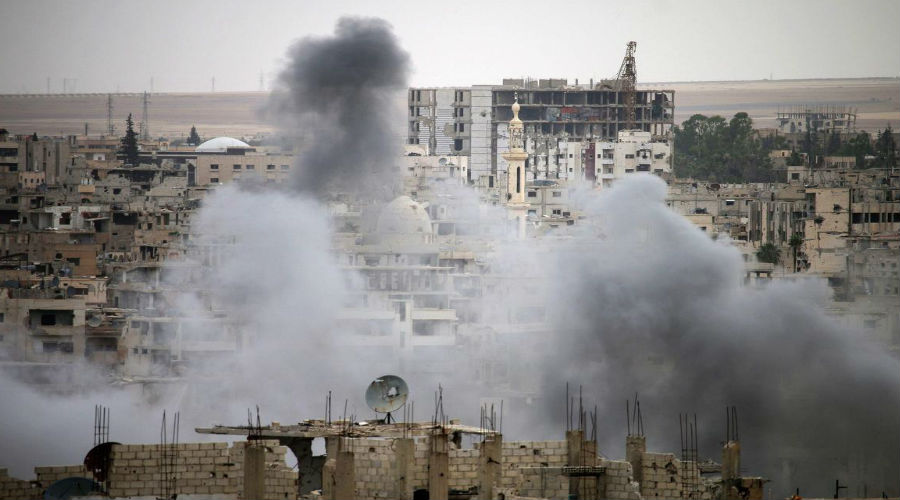A few weeks after the Russian-sponsored border security arrangements and the US-brokered agreement with Jordan and Israel, Syrian regime troops are advancing under Russian air cover in the southern opposition areas in Daraa. The move, which comes as part of an operation through which the regime aims to regain its influence in those areas, would weaken the opposition militarily. However, its ability to alter the balances of power over the next period will hinge on key variables, including, the positions of the concerned international powers, namely Russia and the US, as well as the future possible paths of political developments in Syria.
Strategic Importance
Daraa may be the last battle of symbolic significance to the Syrian regime, as its restoration means delivering a strong blow to the armed opposition, which has tried to overthrow the regime since March 2011. The regime staged a campaign to justify its attempts to restore the area, claiming it is a key gateway for the entry of ISIS – affiliated terrorists. For its own part, the opposition affirmed that this does not correspond with the reality on the ground, which reveals that the actual objective of the regime is to alter the balance of power to its favour, ahead of the coming political benefits and negotiations. The opposition stresses that the regime did not care about the Yarmouk basin, in which ISIS groups are still present, given the remarkable importance of the military operation currently being carried out in Daraa.
The Assad forces regained Busra al-Harir, al-Lajah, and Maliha al-Atash in the north-eastern countryside of Daraa. They also advance slowly in the eastern region due to its geographical nature, towards the areas of al-Harak and Nahata. The military operation covers about 40 km between two points, stretching from Skaka in the south to Shomera north. This means that the regime is attempting to divide the area into small constituents, in parallel with its quest to open an axis towards the countryside of Daraa from the southwestern Sweida countryside, especially after the arrival of reinforcements to its forces.
Divergent Positions
Russia, which, according to numerous reports, oversees the operation of Daraa as part of its plan for Syrian-border security arrangements, seek to extend the scope of its security understandings to include the US also. Russia could achieve many goals through this. The most important of which is undermining the US base in al-Tanf, which many estimates suggest that its role is declining, amid growing calls for its closure in the next phase. This coincides with the emergence of a trend in the US arguing that the base has gradually lost its relevance, and its continuation is no longer in the interest of Washington or its positions towards political and field developments in Syria.
Syrian media are promoting information about the progress of government forces and the pro-regime militias to southern Homs, noting that the US base is now effectively encircled. In parallel, numerous reports published an American message, sent to the opposition factions, in which Washington stated its position that it would not intervene or provide any support to them. The US further called on them to avoid responding to the regime’s provocations.
This prompted many estimates to indicate that Washington’s keenness to adopt such positions reveals the understandings it has reached with Moscow concerning the arrangements being drafted on southern Syria. However, these understandings may embarrass the latter, amid the resentment that Iran and its pro-militia have begun to show, along with the Syrian regime. This resentment reveals that there are insignificant disagreements between those parties, which may gradually exacerbate during the next phase.
Considerable Confusion
Militarily, the opposition factions are fighting a seemingly a foregone battle due to the balances of power enforced by the military confrontations in the past period. Although some 20,000 of their affiliates have been stationed in most of the military fronts, cutting of the supply lines -in light of the US position and freezing the role of al-Tanf base- would make it difficult for the opposition to win the battle militarily. As such, the opposition would likely return to negotiations, despite the many reservations it has on some contentious issues and on the positions of the concerned parties, particularly Russia. The former continues to criticize the latter for supporting the Syrian regime and its air support in the military operations.
Politically, the opposition stressed in its official statements that if the regime succeeds in winning the battle for Daraa militarily, it will not win it politically. The opposition threatens to use political cards such as the “reconstruction” issue, which it said could only begin after reaching a political solution and stabilizing the overall situation in Syria, and the war crimes dossier, which is handled by many international community institutions and Syrian civil society organizations around the world, without showing signs that increase their likelihood of success in employing it to exert further pressure on the regime.
In conclusion, developments in the military operations in Daraa show that the opposition is facing a dilemma that may be the most difficult since the outbreak of the Syrian war, as it is gradually losing its main stronghold in the south, where the regime regaining its influence. Although the Free Syrian Army militias are present in three other locations in Idlib and the north, those areas could serve as a safe haven not a logistic military hub that could threaten the regime.
Given the diminishing influence of the armed opposition, the political opposition faces the same predicament sue to its inability to play the cards it has. Despite the opportunities, that prospective political benefits could provide to the opposition, including the constitutional commission, which is supposed to be shared with the regime, it faces a greater challenge due to its multiple entities and weak structure. Thus, the battle for Daraa will influence the trajectories of the conflict over the next phase.


